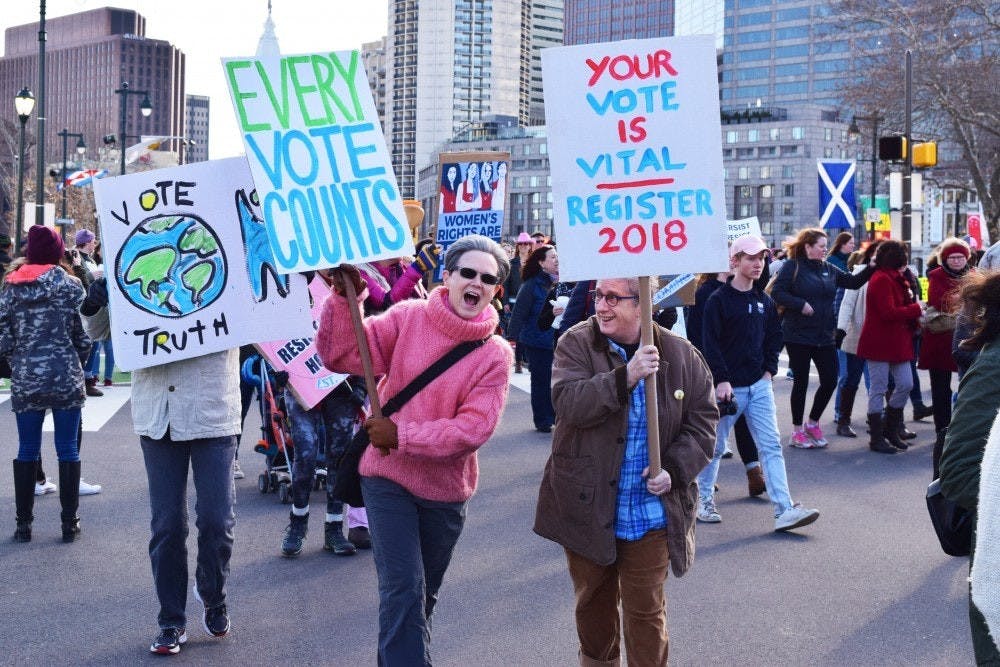
With Nov. 6 only six weeks away, candidates all over the country are vying for seats in their local offices and on Capitol Hill. Midterm elections will bring a sea of fresh faces, campaigning about their desire to represent you on a multitude of issues; but will they? Will they legislate for their constituents, or for their wallets?
If the past is any indication, a bit of wishful thinking might be necessary to trust the United States’ democratic system.
Right here in Philadelphia in 1787, the Constitutional Convention set up a great representative democracy, intended to express the opinions of the people.
So, why do less than one-fifth of Americans today believe that laws enacted by our government mostly reflect what the people actually want? Why do over three-quarters think these laws reflect powerful special interests?
These are results from The Democracy Project, a new bipartisan survey of American attitudes on democracy, commissioned by the Penn Biden Center for Diplomacy and Engagement, the George W. Bush Institute, and Freedom House.
Further, 80 percent of Americans — a majority of both Democrats and Republicans — think that the influence of money is getting worse, not better.
This poll exposes the underlying distrust of public servants that pervades the American public. It spotlights the loss of faith in proper representation in Washington. And it reveals the de-democratization of the country.
People are disillusioned for good reason. Public opinion on many hot-button issues competes with special interests for Washington’s attention.
Constantly making headlines, gun control is one of these issues. On Thursday, three people died in a mass shooting in Maryland. And that was one of three mass shootings last week.
Public opinion evolves with current events, but Washington legislators’ motives do not.
In 2016, the National Rifle Association spent $3.19 million on lobbying, but this leaped to $5.12 million only the following year — just in time to welcome the new, gun-loving administration to Pennsylvania Avenue.
The NRA’s influence dramatically increased in one year, while support for gun rights certainly did not. In fact, public opinion moved in the opposite direction — backing for gun control hit a record high. Support for tougher gun laws has jumped almost 20 points since the end of 2015. In complete contrast to public opinion, gun rights interests have given about $42 million to candidates, parties, and outside spending groups since 1989, while gun control interests have only given $4.3 million.
Instead of constituent voices guiding policy, special interests strategically adjust their access and influence according to political convenience.
And the NRA is not alone. Exxon Mobil spent $11.4 million in 2017, but their peak expenditure was $29 million in 2008. Special interests’ spending fluctuates depending on potential political gain. Is the United States a true democracy, if influence on policy is guided more by private interests than public opinion?

According to the Center for Responsive Politics, in 2017, AT&T spent $11.4 million and DowDuPont dished out $15.9 million for influence on the Hill.
This year, $1.76 billion has already been spent on lobbying.
Penn also contributes millions of dollars to the astronomical figure, spending more on lobbying than any other Ivy League institution. The University advocates for a wide variety of issues, from funding for a “Large Synoptic Survey Telescope” to even taking a stance on the Affordable Care Act. While it is important to ask for government funding, it is certainly undemocratic for Penn to have more influence over government expenditures than other institutions or constituents, simply because of its hefty endowment.
Some claim that lobby groups allow sects of the population to organize and have their voices heard in the government. But, shouldn’t a properly functioning democracy — by definition — be able to reflect the voices of all its citizens, not just those who are bankrolling megaphones into Washington?
While the United States can pat itself on the back for free elections, for a vote that each citizen dutifully carries out, the access and influence of each voter is little to none in the face of the money pots sitting pretty on Capitol Hill.
The Economist Intelligence Unit’s Democracy Index categorizes the United States as a “flawed democracy,” a classification that is unbecoming of its status as the oldest existing democracy in the world or its position as the leader of the liberal international order. Its score of 7.98 out of 10 would surely rise if money were not the most powerful guarantor of government representation.
Is this a dire cry that our votes will not matter this November? No, but it is a dire cry that our votes may be the last shred of influence we can cling onto. Apart from their policy platforms, candidates must also be evaluated against their receptiveness to special interest donations and lobbying in general.
The diagnosis is grim. Until serious attention is paid at controlling a highly lucrative industry in Washington, the United States of America cannot claim to be the democracy it set out to be two centuries ago.

LUCY HU is a College junior from Auckland, New Zealand, studying political science. Her email address is lucyhu@sas.upenn.edu.
The Daily Pennsylvanian is an independent, student-run newspaper. Please consider making a donation to support the coverage that shapes the University. Your generosity ensures a future of strong journalism at Penn.
Donate



